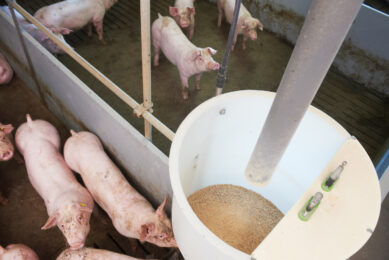Vitamin E can neutralize affects of bad grain on pigs
When the harvest is brought in and the pigs start to be fed with the new grain, problems with the productivity of the pigs are often seen.
When the grain is harvested there are still a lot of biological processes going on in the grain. These processes continue until the grain is sufficiently dry for storage and this may take 1½-2 months. The activity is biggest at unripe and moist grain. Therefore the grain should not be harvested until it is ripe and should the harvest get moist, then it should be dried in a hurry. At gas-tight storage of the grain the lack of oxygen will stop the activity of the grain.
In grain there are enzymes, which ripen the seeds. When the grain is grinded these enzymes become active. The by-product of this enzyme activity is peroxides and free radicals. These substances are aggressive to the cell level, and in this way the animals’ ability to grow and thrive is reduced. The good old “news” is that vitamin E can neutralize these aggressive substances.
Fresh-grain-poisoning costs
This phenomenon about newly harvested grain is also called fresh-grain-poisoning. The negative impact on the productivity results in poor reproduction and reduced gain at the pigs. In the worst case several pigs die due to lack of vitamin E. New insights in vitamin E seem to indicate that there also should be focus on vitamin K when extra vitamin E is applied. Trials have shown that an increased consumption of vitamin E also increases the need for vitamin K. Increased frequency of bleedings from the stomach/intestine system are symptoms in the herd by lack of vitamin K.
New supplementary vitamin E product
Vitfoss has developed a vitamin E product, which contains both vitamin E and vitamin K. The product is called Suplex E-50000/K/Selenium. For every tons feed 1-1.5 kg is used. Remember to hold in readiness for use before harvest. Then problems with fresh-grain-poisoning can be avoided.
Related website:
Vitfoss
For the latest pig news, subscribe here











